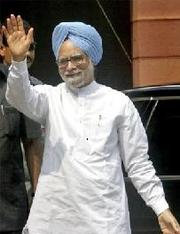India, China row over leader's visit to disputed territory
 New Delhi - India on Tuesday rejected China's objection to a visit by an Indian leader to a north-eastern territory that is still disputed by the two countries.
New Delhi - India on Tuesday rejected China's objection to a visit by an Indian leader to a north-eastern territory that is still disputed by the two countries.
Indian Prime Minister Manmohan Singh visited Arunachal Pradesh over the weekend to campaign for his Congress Party in local elections.
"China expresses strong dissatisfaction on the visit of an Indian leader to the disputed area in disregard of China's grave concerns," Chinese Foreign Ministry spokesman Ma Zhaoxu said in a statement posted on the ministry's website.
The statement said the China-India border had never been officially demarcated and Arunachal Pradesh was a disputed area.
"We urge the Indian side to take China's solemn concerns seriously and do not stir up trouble at the disputed area with a view to ensuring the sound development of China-India relations," Ma said.
"The state of Arunachal Pradesh is an integral and inalienable part of India," India's Ministry of External Affairs spokesman Vishnu Prakash responded, soon after Chinese Ambassador to India Zhang Yang met ministry officials in New Delhi.
Prakash said the people of the Arunachal Pradesh were citizens of India and participants in its "vibrant democracy."
"It is well-established practice in our democratic system that our leaders visit states where elections to parliament and to the state assemblies are taking place," Prakash added.
Prakash said China's statement did not help the process of ongoing negotiations between the two countries to resolve boundary differences in "a reasonable manner and mutually acceptable manner."
Special representatives of India and China are currently engaged in talks to resolve their decades-old boundary dispute.
While India claims China illegally occupies 43,180 square kilometres of India's Jammu and Kashmir state, China accuses India of possessing 90,000 square kilometres of Chinese territory largely in Arunachal Pradesh.
India and China fought a brief war in 1962 after which a formal boundary was not officially demarcated. Both countries maintain troops along the ceasefire line, which has remained largely peaceful. They signed a pact in 1996 to maintain "tranquility" in the area.(dpa)